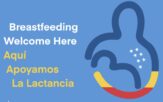- Module: Breastfeeding: Human Medicine Interprofessional Education (IPE) module.
- Study: Breastfeeding Is Associated With a Reduced Maternal Cardiovascular Risk: Systematic Review and Meta‐Analysis Involving Data From 8 Studies and 1 192 700 Parous Women
- Article:
- Population-Based Survey Showing That Breastfed Babies Have a Lower Frequency of Risk Factors for Sudden Infant Death Syndrome Than Nonbreastfed Babies.a
- The Historical, Psychosocial, and Cultural Context of Breastfeeding in the African American Community,
- Breastfeeding and post-perinatal infant deaths in the United States, A national prospective cohort analysis.
- Digital Training on Preventing Racial Bias in Perinatal Care: Dignity in Pregnancy & Childbirth: Preventing Racial Bias in Perinatal Care
Descriptions below
Attention providers and medical professionals: CE credits available for free! The Center for Health Equity, Education, and Research launched the Breastfeeding: Human Medicine Interprofessional Education (IPE) module. Interprofessional Education modules bring nursing, medical, and other professionals in the health field together, stressing the importance of working as a medical team. The free Human Medicine IPE includes breastfeeding scenarios, an interactive Q&A, interviews with health care professionals, and short presentations about breastfeeding. The module can be used by health care providers, lactation counselors, and public health professionals. An Interprofessional Education module brings nursing, medical, and other professionals in the health field together and stresses the importance of working as a medical team. It can also be used by lactation counselors, public health professionals, families, and all breastfeeding supporters. As far as we know, this is the first ever breastfeeding IPE!
The Journal of the American Heart Association published a study titled “Breastfeeding Is Associated With a Reduced Maternal Cardiovascular Risk: Systematic Review and Meta‐Analysis Involving Data From 8 Studies and 1 192 700 Parous Women.” The study systematically reviewed published evidence on the association of breastfeeding with maternal risk of cardiovascular disease (CVD) outcomes. The review found that women who breastfed had a lower risk of future cardiovascular disease, coronary heart disease, stroke, and fatal cardiovascular disease.
Breastfeeding Medicine released an article titled “Population-Based Survey Showing That Breastfed Babies Have a Lower Frequency of Risk Factors for Sudden Infant Death Syndrome Than Nonbreastfed Babies.” The authors conducted a cross sectional observational study to explore breastfeeding and bed-sharing practices. Based on the results of their study, the authors found a close relationship between breastfeeding and bed-sharing and a lower frequency of SIDS risk factors associated with both practices.
Breastfeeding initiation is significantly associated with reduced odds of post-perinatal infant deaths in multiple racial and ethnic groups within the US population. These findings support efforts to improve breastfeeding in infant mortality reduction initiatives. Breastfeeding and post-perinatal infant deaths in the United States, A national prospective cohort analysis.
Breastfeeding Medicine released an article titled The Historical, Psychosocial, and Cultural Context of Breastfeeding in the African American Community, an incredible, difficult, and powerful read! This article is particularly impactful while knowing that the American Academy of Pediatrics recently updated its Policy Statement: Breastfeeding and the Use of Human Milk recommendations to support optimal infant and young child growth and development. We know that community support of breastfeeding is critical for supporting Black Breastfeeding families. Federal paid leave protection and other federal policies are vital to ensure equity in access to the protections for families and critical to supporting families to meet their feeding goals. We remain committed to advocating for policies that foster equitable protections for families to meet the needs of their infants and young children, including the Black Child National Agenda.
Diversity Science released an on-demand complimentary course for individuals titled “Dignity in Pregnancy & Childbirth: Preventing Racial Bias in Perinatal Care.” The course uses real-life, composite stories to illustrate the way racial bias, however unintended, can undermine perinatal care. It also provides specific, concrete, evidence-based strategies for interrupting racial bias. The course is also available for organizations.
Adapted from information sent in the U.S. Breastfeeding Committee newsletter, the Weekly Wire.
